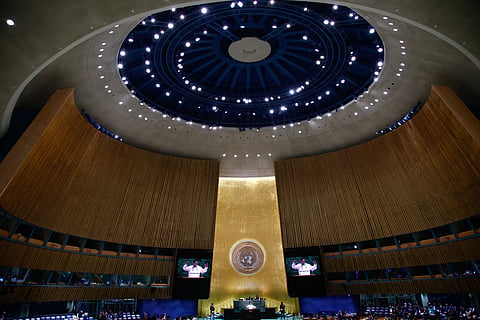United Nations General Assembly 2025: Key questions answered as world leaders debate in New York
UNGA underway — with fiery Lula–Trump speeches, 150+ leaders, and global crises in focus

Dubai: The world is watching New York as the United Nations General Assembly (UNGA) enters its high-level debate, with more than 150 presidents, prime ministers and ministers addressing the planet’s most urgent crises.
Now in full swing, the 80th session has already seen sparks fly — Brazil’s Luiz Inacio Lula da Silva and US President Donald Trump delivered back-to-back speeches that set a combative tone for the week.
From Palestine’s stalled bid for full membership to climate change, artificial intelligence and global conflicts, this year’s UNGA is testing whether nations can find common ground amid deep divisions.
With the spotlight firmly on New York, here’s a smart guide to everything you need to know about the UNGA
What is the UN General Assembly (UNGA)?
The UNGA is the world’s largest diplomatic gathering, where all 193 UN member states have an equal voice — one country, one vote. It is the main policymaking and representative organ of the United Nations, tackling global issues from peace and security to climate change and human rights.
Highlights
Debate in motion: High-level General Debate opened September 23 in New York
Tensions early: Lula and Trump’s back-to-back speeches set a combative tone
Global stage: 150+ leaders to speak on peace, Palestine, climate and AI
Agenda: Theme is “Better Together: 80 years and more for peace, development and human rights”
Controversy: US denial of visas to Palestinian reps sparks diplomatic row
When does the UNGA take place?
The UNGA opens every year on the second Tuesday of September. This year, it began on September 9 with the election of the new president, adoption of the agenda, and organisational work.
The highlight is the General Debate, which started on September 23 and runs through September 27, then resumes on September 29. Sunday is a day off.
What happens during the General Debate?
World leaders deliver speeches outlining their views on pressing international challenges.
Sessions: Morning (9am–2:45pm local / 13:00–18:45 GMT) and afternoon (3pm–9pm local / 19:00–01:00 GMT).
Participants: More than 150 heads of state and government.
Time limit: Speeches should last 15 minutes, but many run longer.
All statements are recorded and posted on the UN website.
Who speaks first?
By tradition since 1955, Brazil always speaks first. The United States, as the host country, speaks second.
This year that means Brazilian President Luiz Inacio Lula da Silva took the podium first, followed immediately by US President Donald Trump.
Where is the UNGA held?
At the UN headquarters in New York City, on the East River in Manhattan. Built between 1949 and 1952, it includes:
The General Assembly Hall (1,800 seats)
The Security Council Chamber
The Secretariat building (administration hub)
The Dag Hammarskjöld Library
Outdoor spaces with sculptures donated by member states
While almost all sessions since 1952 have been in New York, notable exceptions include 1988 in Geneva, after the US denied a visa to Palestinian leader Yasser Arafat.
What issues dominate the 80th UNGA agenda?
The theme is: “Better Together: 80 years and more for peace, development and human rights.”
Key issues include:
Palestine’s participation and membership bid
Climate change and sustainability
Artificial intelligence governance
Global food security
Ongoing wars and regional conflicts
Who can take part besides UN member states?
Alongside 193 members, the Holy See (Vatican City), the State of Palestine, and the European Union participate as observers with speaking rights.
How does a country join the UN?
Apply to the UN secretary-general.
Secure approval from the Security Council (needs 9 yes votes, no veto from permanent members).
Win a two-thirds majority in the General Assembly.
Once approved, the country’s flag is raised at UN headquarters, and it gains full voting rights.
Why isn’t Palestine a full UN member?
In 2012, Palestine’s status was upgraded to a non-member observer state.
On April 18, 2024, the US vetoed a Security Council resolution that would have granted Palestine full UN membership, despite widespread international support.
As a result, Palestine can participate in debates but cannot vote.
Why is this year’s UNGA particularly controversial?
The US again denied visas to Palestinian representatives, forcing them to participate virtually. Critics argue this breaches the Host Country Agreement, which obligates the US to let all leaders attend with full diplomatic immunity.
Sign up for the Daily Briefing
Get the latest news and updates straight to your inbox




